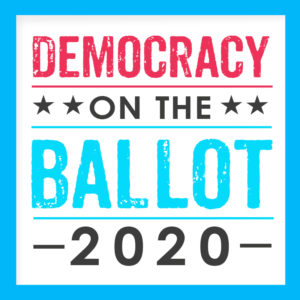Summary of Election-Related Ballot Measures for the November ballot

Election results below
In November voters in 14 states and Puerto Rico decided 20 ballot measures impacting how they vote and conduct elections.
2020’s ballot questions took on a range of election topics such as the National Popular Vote, Ranked Choice Voting, Nonpartisan Redistricting, Open Primaries, and Restoring Voting Rights to citizens with a past conviction.
Use the links below state name for Ballotpedia’s summary of each question.
BLUE=PASSED GREEN=REJECTED
| STATE | TOPIC(s) | A YES VOTE – | % YES | % Votes Cast |
|
Alabama |
Citizen Voting | Replaces every citizen can vote with only citizens can vote in the state constitution. | 77% | 100% |
|
Alaska |
Top 4 Primaries, Ranked Choice Voting, Campaign Finance | Calls for Top-Four primaries for state legislative and congressional offices; Ranked-choice voting for general elections; Disclosure of outside donations of $2,000+ | 50.2% | 98% |
|
Arkansas |
Term Limits | Lowers term limits to 12 years for state legislators | 55% | 94% |
|
Arkansas |
Ballot Measure Requirements | Creates stricter requirements to qualify citizen ballot initiatives and initiatives referred by the legislature. | 44% | 94% |
|
California |
Voting Rights Restoration | Allows Californians on parole for a felony to vote. | 59% | 97% |
|
California |
Voting Age for Primaries | Allows 17-yr-olds who will be 18 by the general election to vote in primary elections. | 44% | 97% |
|
Colorado |
Citizen Voting | Replaces every citizen can vote with only citizens can vote in the state constitution. | 68% | 98% |
|
Colorado |
Electoral College | Confirms legislature’s vote to have Colorado join the Interstate Compact for a National Popular Vote for president. | 52% | 98% |
|
Florida |
Citizen Voting | Replaces every citizen can vote with only citizens can vote in the state constitution. | 79% | 98% |
|
Florida |
Top 2 Primaries | Calls for Top-Two open primaries. The top two vote-getters, regardless of partisan affiliations, advance to the general election. | 57%** | 98% |
|
Florida |
Ballot Measure Approval | Requires voter-approved constitutional amendments to be approved by voters again at a second general election. | 48% | 98% |
|
Massachusetts |
Ranked Choice Voting | To Adopt Ranked Choice Voting for state and federal elections | 45% | 92% |
|
Missouri |
Nonpartisan Redistricting | Repeals the 2018 voter approved initiative that established a process for nonpartisan redistricting. | 51% | 98% |
|
Mississippi |
End Jim Crow System for State Elections | 1. Removes the requirement that statewide candidates get the most votes in a majority of all state house districts. 2. Has a runoff if no candidate has a majority, instead of the winner chosen by the House of Representatives. | 78% | 97% |
|
Nevada |
Statement of Voting Rights | Adds a section to Constitution guaranteeing specific voting rights to all. | 61% | 98% |
|
New Jersey |
Delay Redistricting |
Delays redistricting until after the 2021 state election if the census data is not ready by Feb.15 2021. | 58% | 98% |
|
No. Dakota
|
Ballot Question Approval | Requires a voter-approved constitutional amendment be voted on a 2nd time if the State Legislature doesn’t approve its passage. | 38% | 90% |
|
Oregon |
Campaign Finance Limits | Authorizes state and local government to limit campaign contributions and expenditures; require disclosure of donors and spending; and have ads identify who paid for them. | 79% | 94% |
|
Virginia |
Nonpartisan Redistricting | Creates a bipartisan redistricting commission to draw congressional and state legislative districts. | 66% | 98% |
|
Puerto Rico |
Vote on Statehood |
A non-binding yes or no vote on whether Puerto Rico should seek to become a state. | 52% | 100% |
** Florida has a 60% threshold for constitutional amendments
Ranked Choice Voting was adopted by ballot measure in Albany, CA (72%), Bloomington, MN, (51%) Boulder, CO(78%), Eureka, CA(62%), and Minnetonka, MN(55%). Voters said “yes” to all five. See cities and states that already used ranked choice voting here.
Prepared by George Pillsbury, Senior Policy Advisor, Nonprofit VOTE, [email protected]




